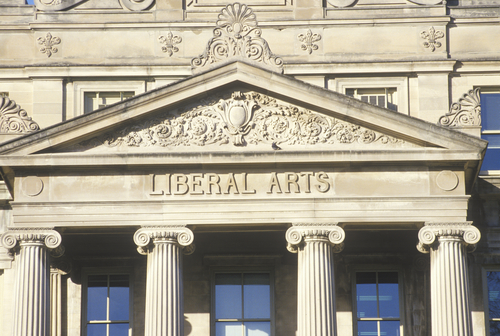What Does a Liberal Arts Education Mean to You

When you're comparison colleges as a prospective pupil, consider what kind of school is right for you and what kind of education you want. Liberal arts colleges provide students with a broad education that combines numerous subjects of study in the arts, natural and social sciences, and humanities for the purpose of learning how to retrieve and communicate. Rather than preparing students for a single career path, a liberal arts education equips students with the skills and knowledge they need to be improve learners, thinkers, and global citizens.
A Liberal Arts Curriculum
At a liberal arts college, you will study a variety of subjects in the arts, humanities, and natural and social sciences. Students in liberal arts colleges may study several of the creative arts. Courses in art, music, theatre, and artistic writing are common. The humanities refer to subjects that study the human being condition and culture. In liberal arts programs, students often take humanities courses such equally history, classical or modern strange languages, philosophy, English literature, and theology. Social sciences, too, hold an important place in a liberal arts curriculum. Await to study subjects like sociology, geography, anthropology, political scientific discipline, and economics during your liberal arts instruction.
You might not be able to tell by the proper name, merely mathematics and science are crucial subjects of study in a well-rounded liberal arts education. Courses like biology, physics, and chemistry are common in a liberal arts curriculum. Students typically have to have a minimum of one college-level math class during their academic careers, with options ranging from statistics to algebra, trigonometry, and calculus.
The Jobs of Tomorrow
Well-nigh people have a moment when they're immature where they think, When I grow up, I'm going to be a ____ and they fill in the blank with whatever career appeals to them at that moment. While it'due south nice to dream about the jobs nosotros might agree tomorrow, the truth is most people don't actually know what the jobs of tomorrow will be. According to Southwestern University, this statement isn't hyperbole. Around 65% of students today will be in jobs in the future that don't exist today. Even more than unsettling is the fact that 40% of the jobs that currently exist won't exist in the future. They'll become obsolete.
It begs the question, then, how are students expected to fix for this eventuality? Won't this reality make college degrees useless? No, that isn't the case. The people who are best suited for these jobs are those who studied the liberal arts.
Here'southward why. A liberal arts education teaches students how to recall and to solve problems. Recollect about it this way. One plus i always equals two. Unfortunately, issues fill the globe that don't fit into bang-up mathematical equations. More than one correct respond to a problem often exists. Some problems also require more than one solution in order for them to be solved effectively. Those who know how to use their creative muscles unremarkably solve those problems.
…It'southward technology married with liberal arts, married with humanities, that yields united states of america the results that make our heart sing. – Steve Jobs
It isn't that Stem career fields don't accept their place in the world. They definitely do. However, equally even many in the STEM fields have begun to discover, the bug that cause problems in the STEM earth are man problems. Technology past itself won't solve those problems. Someone with an understanding of both Stem and the humanities has a better shot at information technology.
Information technology stands to reason, then, that the jobs of the future will exist held past people who know how to solve problems, perchance even problems that the mod workplace hasn't experienced yet. The liberal arts students of today have put themselves in the position of being the workplace trouble-solvers of tomorrow. They become the people working in the jobs of tomorrow.
Education Across the Disciplines
A liberal arts education equals an education that spans the disciplines. Many universities require their students to complete a sure number of classes in subjects that aren't related to a pupil's major. Schools oftentimes call these clusters of classes core or foundational classes. These include classes in literature, arts, sciences, mathematics and social sciences. These courses provide students with a foundational noesis of the world and its history.
These classes innovate students to subjects they may non encounter otherwise. Sometimes, these courses fifty-fifty influence a educatee'south decision when it comes time to pick a major. A class that introduces students to the study of art, biology, or field archeology may go the stepping rock to a whole career downwards the route. Given that many students enter college with no particular major in mind, it really is possible for a seemingly random form to change a pupil'due south whole career outlook. Often that's how people run across their dream careers: by accident.
Aside from this, these classes help students understand how one discipline affects some other. For instance, in a foundational geology course, students may learn that in 1815, a volcano erupted in Indonesia. According to Forbes, the effects of the 1815 volcano were such that information technology changed the weather around the earth, including in Europe in 1816. That year likewise happened to exist the twelvemonth that Mary Shelley wrote "Frankenstein." Shelley's book was partly influenced by the dark and stormy weather that the volcanic eruption acquired. In fact, people called 1816 "the year without summer" considering the volcanic ash acquired terrible weather.
Growing crops was impossible in 1816. People starved. They moved across the European landscape in search of food, much the manner the creature in "Frankenstein" did. His appearance is said to exist inspired past those climate refugees. Out of this devastation came one of the nigh honey pieces of literature the world has e'er known.
A liberal arts education exposes students to facts like this. It allows them to see how seemingly unrelated events affect the world. This exposure gives rise to newer, broader means of thinking. As "Frankenstein" proves, a situation that occurs halfway effectually the globe from someone tin can have profound effects on localities half a globe away. The study of liberal arts teaches students about these events. It as well forces them to examine how they might bargain with such an upshot, which broadens their creative thinking and problem-solving skills.

A Component of STEAM
Many people who piece of work in technology have begun to understand that not anybody wants a career in a Stalk field (science, technology, applied science, or math). However, that doesn't mean that liberal arts majors and Stem majors need to be at cantankerous-purposes with each other. On the contrary, each discipline has something to offer its counterpart.
The addition of the "A" and the "R" to STEM brings both the arts and reading and writing into the STEM curriculum. Truth be told, many students in the liberal arts use technology every day to do their work. On the flip side, those who embrace Stalk fields run across the shortfall that only concentrating on STEM causes.
Very ofttimes, Stem issues aren't due to technical problems per se. Instead, they ascend because humans run applied science. They encounter ethical problems. They realize that the digital divide keeps some people from accessing engineering science in a way that is meaningful. STEM training alone doesn't solve these bug. Knowledge of the human condition and ideals often does. For example, a pupil who studied philosophy may keep to accept a career in health administration or law, according to the University of Maryland considering these career fields require people to accept an understanding of ethics and the humanities.
That being said, a person who has studied philosophy, one of the many liberal arts majors available to students, is in a unique position to move into a tech career. This is due in role to the fact that this particular liberal arts caste requires students to written report logic. It also taps into how the encephalon works and how people recall. That being said, modern computer scientists ofttimes try to replicate how the human brain thinks, something that liberal arts majors must recall about a lot. This puts many liberal arts majors (and non only philosophy majors) in the running for some very absurd, very lucrative careers.
Career Options for Liberal Arts Majors
Many people mistakenly believe that a liberal arts education is the easy fashion to a caste. Naught could be further from the truth. A liberal arts education requires students to adhere to rigorous standards of inquiry, to develop problem-solving skills, and to expend a big dose of commitment in club to attain their educational goals.
A liberal didactics too prepares students for a number of careers that may non seem to be related on the surface. Nevertheless, due to the broad nature of these types of degrees and due to the transferable skills they teach students, a liberal arts degree can actually translate into very lucrative job options.
 Some liberal arts students parlay their ability to write, a skill they honed during their college days, to become writers. Many turn to careers in journalism or public relations. Others combine their honey of technical subjects and writing to go technical writers. Depending on the job they exercise and the number of years of experience they bring to the table, these old liberal arts majors earn between $61,000 and $lxx,000 a year.
Some liberal arts students parlay their ability to write, a skill they honed during their college days, to become writers. Many turn to careers in journalism or public relations. Others combine their honey of technical subjects and writing to go technical writers. Depending on the job they exercise and the number of years of experience they bring to the table, these old liberal arts majors earn between $61,000 and $lxx,000 a year.
Others plow their love of promotion into a lucrative career in the field of marketing. Possible jobs include marketing managing director, SEO author, advertising designer, or art director. These professionals earn between $100,000 and $131,000 per year, according to Maryville University.
The field of education too proves to be a popular option among liberal arts graduates. Typically, these graduates choose a major, like art or biology, and and then they tack on classes in education. If these students earn a bachelor'due south degree, they become elementary or high school teachers. If they earn advanced degrees, like a master'southward or doctorate, they qualify for education positions at the university level.
Given how much liberal arts students must read and write during the course of their studies, it'south no wonder that many of them become excellent researchers in the process. This skill qualifies them to go research analysts. Big companies hire researchers when they demand to make decisions about rolling out new products services or if they want to move into new markets. Research analysts make near $lxxx,000 a yr on boilerplate.
 Translators and interpreters ordinarily come up to the ranks of former liberal arts majors. People who major in world languages put themselves in a position to translate documents, books, TV shows, and movies or to interpret proceedings at conferences, business meetings, and in courtroom. U.South. News & World Report proper name translation and interpretation every bit the #1 jobs on the news site's All-time Creative and Media Jobs list.
Translators and interpreters ordinarily come up to the ranks of former liberal arts majors. People who major in world languages put themselves in a position to translate documents, books, TV shows, and movies or to interpret proceedings at conferences, business meetings, and in courtroom. U.South. News & World Report proper name translation and interpretation every bit the #1 jobs on the news site's All-time Creative and Media Jobs list.
People who speak Castilian, Chinese, German, Portuguese, and Russian have specially lucrative futures alee of them. Demand for those who have these skills is expected to increment by almost xx% through the year 2028. On average, translators and interpreters make about $50,000 per year, though the best paid among them brand $67,000 a year and above.
An Instruction for the Sake of Learning
At a liberal arts college, the main goal is education itself, more then than job training, according to The Hechinger Report. Instead of focusing mainly on learning specific technical skills that can become outdated very speedily thanks to changes in engineering science and the economic system, a liberal arts teaching teaches students to call up, acquire, and communicate. That doesn't mean a liberal arts education is useless for getting a task. A liberal arts curriculum includes plenty of reading, critical thinking, and piece of work involving written and spoken communication. This makes for bang-up preparation for graduate schoolhouse in subjects such as concern, applied science, police force, and even medicine.
The instruction path also allows students a chance to cultivate versatile skills that employers in all fields prize, like teamwork, communication, and analytical skills, CBS News reported. Liberal arts students get proficient at thinking critically, seeing the big moving-picture show, working with a team, and communicating well. Between these skills and their solid educational groundwork in many subjects, liberal arts students accept a strong foundation that allows them to fit into a wide variety of careers.
A liberal arts education is a great selection for students who love to learn and want to develop abilities that make them meliorate students, more than insightful employees, and more enlightened citizens.
Related Resources:
20 Affordable Master'south in Journalism Online Programs
Top xxx Well-nigh Affordable Primary's in Reading Online Programs
Pinnacle 10 Highest Paying Jobs For Liberal Arts Majors
Source: https://www.bestcollegesonline.org/faq/what-does-a-liberal-arts-education-teach-you/
0 Response to "What Does a Liberal Arts Education Mean to You"
Post a Comment